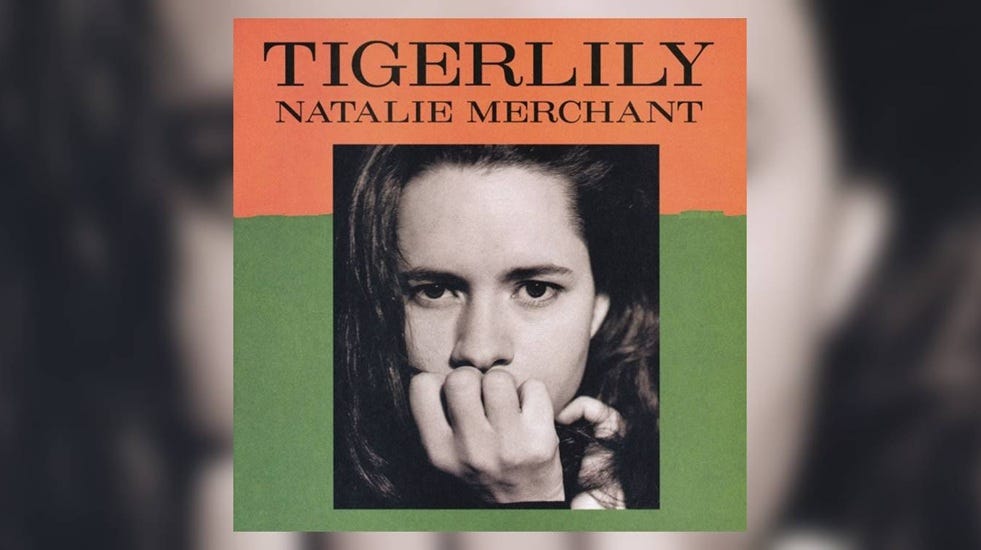When Natalie Merchant walked away from 10,000 Maniacs in 1993 after more than a decade as the band's mesmerizing frontwoman, the music world held its breath. Could the voice that had enchanted millions with songs like "These Are Days" and "What's the Matter Here?" find its way as a solo artist? The answer came emphatically in June 1995 with the release of Tigerlily, an album that would prove to be one of the most commercially successful and artistically compelling debuts of the decade.
Tigerlily emerged from a place of profound personal transformation. After twelve years of collaborative songwriting and the pressures of band dynamics, Merchant found herself with the freedom to explore her own creative vision without compromise. The album's title, taken from a William Blake poem, hints at the delicate yet fierce beauty that would characterize the entire work. It's a record that feels both intimate and expansive, rooted in folk traditions yet unafraid to venture into unexpected sonic territories.
The album's genesis was as carefully considered as its execution. Merchant assembled a small, tight-knit group of musicians, including drummer Peter Yanowitz and bassist Barrie Maguire, both formerly of The Wallflowers, and 22-year-old guitar prodigy Jennifer Turner. This wasn't a supergroup or a star-studded affair, but rather a collection of skilled musicians who understood how to serve the songs rather than overshadow them. The chemistry between these players creates a sense of musical telepathy throughout the album, with each instrument finding its perfect place in Merchant's carefully crafted soundscapes.
What strikes listeners immediately about Tigerlily is its emotional directness. Gone are the more obtuse poetic flourishes that sometimes characterized 10,000 Maniacs' work. Instead, Merchant presents songs that feel like pages torn from a diary, raw and unguarded yet beautifully structured. The opening track, "San Andreas Fault," sets the tone with its geological metaphor for personal upheaval, while "Wonder" transforms childhood innocence into something transcendent and heartbreaking. These aren't just songs; they're emotional excavations, each one revealing another layer of Merchant's psyche.
The album's commercial success was as surprising as it was deserved. In an era dominated by grunge and alternative rock's more aggressive tendencies, Tigerlily offered something different: sophistication without pretension, vulnerability without weakness. The album peaked at number 13 on the Billboard 200 and eventually achieved five-times platinum certification, spawning three consecutive top-40 hits with "Carnival," "Wonder," and "Jealousy." For a solo debut by a folk-influenced singer-songwriter, these numbers were virtually unprecedented.
"Carnival" deserves special mention as the album's lead single and perhaps its most complex composition. Featuring Welsh singer-songwriter Katell Keineg, the song weaves together themes of displacement, longing, and the search for belonging. The collaboration with Keineg adds layers of cultural and musical texture that elevate the track beyond typical radio fare. It's a song that rewards repeated listening, revealing new details and emotional nuances with each encounter.
The album's production, handled by Merchant herself, demonstrates her keen understanding of how to create space for her voice while maintaining the intimacy that defines her best work. There's a warmth to the recording that makes even the most melancholic moments feel like conversations with a close friend. The arrangements are never cluttered, never competing for attention, but rather working in service of the songs' emotional cores.
Tigerlily also showcases Merchant's growth as a lyricist. While her work with 10,000 Maniacs often dealt with social and political themes, this album turns inward, exploring personal relationships, childhood memories, and the complexities of adult emotions. Songs like "Jealousy" and "The Letter" reveal a writer unafraid to examine her own contradictions and vulnerabilities, creating a body of work that feels both deeply personal and universally relatable.
The album's influence extends far beyond its commercial success. Tigerlily helped establish a template for how established artists could successfully transition to solo careers, prioritizing artistic integrity over commercial expectations. It demonstrated that there was still an audience for thoughtful, melody-driven songwriting in an increasingly fragmented musical landscape.
Nearly thirty years after its release, Tigerlily remains a touchstone for anyone interested in the intersection of folk tradition and contemporary songwriting. It's an album that rewards both casual listening and deep analysis, offering new discoveries with each encounter. For The Mad Music Asylum's Friday Long Play, it represents the perfect opportunity to immerse ourselves in a work that stands as both a remarkable artistic achievement and a testament to the power of following one's creative vision, regardless of commercial pressures or industry expectations.
This is music that demands to be experienced in its entirety, each song flowing into the next like chapters in a beautifully written novel. Tigerlily isn't just an album; it's a complete emotional journey, one that reminds us why we fell in love with music in the first place.






It's easily at the top of my list of favorites from 1995 (at least top three), and in the top 20 of my best of the '90s. Natalie deserves all her flowers, as the kids say.
awesome post on a phenomenal record that still holds up decades later. hard to believe it’s 30 years old. 10,000 Maniacs was the first concert I saw after moving to college in fall 1989.